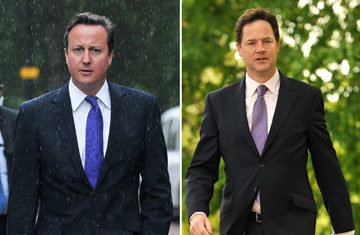
British Prime Minister David Cameron, left, and Deputy Prime Minister Nick Clegg on May 5, 2011, the day of the Alternative Vote (AV) referendum
One year ago, British voters made history by forcing rival politicians into the first U.K. coalition government since the end of World War II. They celebrated the first anniversary of that event on Friday, May 6, by delivering verdicts in a series of elections that could yet tear that same coalition government apart.
A day earlier, on a "super Thursday" of polls, there were elections for all 279 local administrations outside London and for the devolved assemblies in Wales, Scotland and Northern Ireland. On top of that was the first nationwide referendum in 36 years, offering voters the chance to replace the first-past-the-post, winner-take-all system of national parliamentary elections with the Alternative Vote (AV) system, in which they could rank candidates in order of preference. (Meanwhile, voters in Scotland handed the Scotland Nationalist Party the first overall majority in the Edinburgh parliament's 12-year history, ensuring that there will be a referendum within five years on Scottish independence.)
The AV referendum was the single biggest concession Conservative Prime Minister David Cameron handed Liberal Democrat leader Nick Clegg a year ago to woo the junior partner into the Conservative-led coalition government. The deal was done with the full knowledge that Clegg and his party would lead the campaign for a yes vote in the referendum while Cameron and his party would back the no campaign.
As the results of all the various polls cascaded in Thursday night and Friday, the verdict was clear, unequivocal and, for the Liberal Democrats and their leader, devastating. Not only was the party virtually wiped out in local councils and assemblies as voters punished them for sacrificing election promises — notably over the introduction of university tuition fees — as part of the coalition deal, but it also lost the referendum by almost 2 to 1 as voters decided they did not want AV, a system that could have led to more coalition governments in the future.
Clegg's humiliation was sharpened by his belief that Cameron had promised not to lead a heavily partisan no campaign against AV but reneged after his own party warned him not to allow the yes campaign to win by default. That breakdown in trust, in what had until now been a surprisingly close relationship, threatens to undermine the coalition government.
Senior Liberal Democrats are furious at Cameron's "breach of faith" over the referendum campaign, as former Lib Dem leader Lord Paddy Ashdown branded it in a newspaper article before the vote, and are promising that Clegg will now be more robust and demanding in government, fighting for major concessions from Cameron over big issues like the hugely controversial reforms to the state-run National Health Service.
And if Clegg is to shore up his massively weakened position as Deputy Prime Minister, he needs to appease those grass-roots members of his party who in large numbers opposed the coalition with the Conservatives in the first place and now have very good reason to say, Told you so.
Meanwhile, Cameron, who on Friday defied all predictions and won seats in the local polls — thanks in large part to Clegg's taking much of the incoming fire — will be pressed by his party to ditch his junior partner and call an early general election in a bid to win an outright majority in Parliament.
But echoing the general sentiment in Britain, Tim Montgomerie, founder of the influential Conservative Home website, believes the coalition will continue, as Cameron has insisted it will. "The coalition is going to go into a more mature and honest phase," he says. "The idea that they agreed on everything was always unsustainable anyway, but any concessions [going forward] will not be about keeping the Lib Dems in the coalition but about keeping Clegg as leader. Cameron doesn't want the Lib Dems landing him with another leader now."
Ivor Gaber, a professor of politics and journalism at London's City University, agrees there will be no early general election but thinks the coalition government could yet be destroyed by dissident Liberal Democrats in Parliament. "Cameron now has an angry, humiliated and embarrassed coalition partner and will have to offer concessions to stop the Lib Dems' splitting," says Gaber. "It's not inconceivable that a significant section of the Liberal Democrats in Parliament breaks away and refuses to continue to support the coalition."
What is certain is that the yearlong honeymoon enjoyed by Clegg and Cameron after they sealed their union in the rose garden of 10 Downing Street last May is well and truly over. The question now is whether they can avoid divorce.
